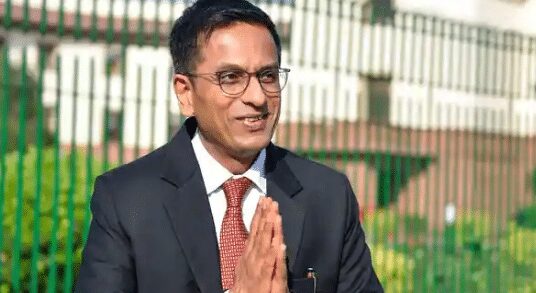Would be Longest CJI in Recent Memory
The 50th Chief Justice of India, Justice Dhananjaya Y Chandrachud, was sworn in at a ceremony held in Rashtrapati Bhavan, President Droupadi Murmu gave him the oath of office.

Justice Chandrachud was recommended by outgoing Chief Justice UU Lalit as his successor on October 11; the President accepted the recommendation the following day, on October 17. Justice Chandrachud will serve as CJI from November 10, 2024, for a term of more than two years, one of the longest in recent memory.
Serving the ordinary citizen is my priority,” CJI Chandrachud

In his first statements to the media after the swearing-in ceremony, Chief Justice of India Justice Chandrachud said, “Serving the ordinary citizen is my priority,” and promised reforms in the registry and judicial processes. He told NDTV, “My work, not words, will speak.” Vice President Jagdeep Dhankhar, Union Home Minister Amit Shah, Law Minister Kiren Rijiju, Defence Minister Rajnath Singh, Finance Minister Nirmala Sitharaman, Commerce Minister Piyush Goyal, Lok Sabha Speaker Om Birla, previous Chief Justice of India UU Lalit, and other Supreme Court judges were present at the function. The most recent of Chief Justice of India Justice Chandrachud’s liberal and progressive rulings preserving unmarried women’s rights to seek abortions of pregnancies up to 24 weeks was one of his many. He was a member of the Constitution Benches that oversaw the decriminalization of adultery and the recognition of privacy as a basic right under Article 21. He was a member of the group that supported the Sabarimala temple’s admission of women of all ages. Ayodhya-Babri Masjid case was determined by a 5-judge panel, which included Chief Justice of India Justice Chandrachud.
Chief Justice Chandrachud & His Journey
The Supreme Court upgraded Justice Chandrachud on May 13, 2016. From October 31, 2013, till that point, he served as Chief Justice of the Allahabad High Court. On March 29, 2000, he was appointed to the Bombay High Court as a judge, beginning his judicial career. From 1998 until his appointment as a judge, he served as India’s Additional Solicitor General. In 1998, the Bombay High Court named him a Senior Advocate. Justice Chandrachud attended St Stephen’s College in New Delhi and earned a BA with honors in economics. He completed an LLB program at the Campus Law Centre of Delhi University and went on to get an LLM and a Doctor of Jurisprudence (SJD) from Harvard Law School in the United States.
D.Y.Chandrachud & His Significant Years
A Justice Chandrachud-led panel issued a number of measures to ease the suffering caused by the Covid crisis. More recently, a bench he presided over broadened the definition of “unmarried woman” in the Medical Termination of Pregnancy (MTP) Act. Chief Justice of India Chandrachud had a significant year in 1998. Despite being only 38 years old, he received the Senior Advocate designation in June; advocates under the age of 40 are rarely accorded this title. Additionally, he was appointed as India’s Additional Solicitor General, a position he held up to March 29th, 2000, when he was elevated to the position of Judge of the Bombay High Court. Chief Justice of India Chandrachud talked highly of his time serving as a judge in the Bombay High Court. He attributes the change in his perspective regarding crimes against women to Justice Ranjana Desai, with whom he shared a criminal bench. He acknowledges that in his early years as a judge, he used a “straight-jacketed approach,” but working with Justice Desai provided him with the “required feminist viewpoint” to apply the law to social reality. His Supreme Court decisions, such as Lt. Colonel Nitisha (2021), where he acknowledged the notion of “indirect discrimination” and ruled that women should also be given consideration for Permanent Commissions in the Army, demonstrate this point of view.













